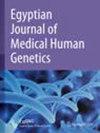Association of leptin–melanocortin gene polymorphisms with the risk of obesity in northwest Indian population
IF 1.2
Q4 GENETICS & HEREDITY
引用次数: 0
Abstract
Obesity, a multifaceted endocrine issue, is adversely affecting all age groups and is posing a significant public health challenge. The genetic polymorphisms of the melanocortin 4 receptor (MC4R) and leptin (LEP) genes likely contribute to the development of obesity. The present study aimed to explore the effects of MC4R and LEP gene polymorphisms on obesity among the northwest Indian population. The present study was conducted among 333 obese cases and 338 non-obese controls (aged 18–50 years). All subjects underwent measurements for anthropometric, physiometric, as well as biochemical parameters. Genotyping for MC4R and LEP gene variants was performed using the polymerase chain reaction (PCR)-based restriction fragment length polymorphism (RFLP) method. However, 10% of the samples for each variant were confirmed using the Sanger sequencing method. The polymorphisms of leptin–melanocortin pathway genes (MC4R-LEP) were found to be significantly associated with various obesity-related parameters like waist circumference: p = 0.017, waist-to-height ratio: p = 0.009, total cholesterol: p = 0.0001 and triglycerides: p = 0.0001. Both the LEP gene variants rs2167270 and rs7799039 conferred 2.4- and 2.2-fold risk toward obesity under the recessive genetic model [OR (95% CI) 2.42 (1.44–4.07), p = 0.001; OR (95% CI) 2.26 (1.41–3.60), p = 0.0001, respectively]. All four polymorphisms of the MC4R and LEP genes demonstrated a strong interaction of 82.1% with the lifestyle factor (p = 0.001). The haplotype combinations A–A for rs571312 and rs12970134 conferred twofold risk [OR (95% CI) 2.61 (1.10–6.20), p = 0.028]. However, the combination A–G for rs2167270 and rs7799039 predicted sixfold risk [OR (95% CI) 6.02 (3.39–10.68), p = 0.0001] toward the obesity development in this population. Our study revealed a connection between MC4R (rs571312, rs12970134) and LEP (rs2167270, rs7799039) gene variants with obesity, highlighting their prominent role in assessing the risk of obesity among the northwest Indian population.印度西北部人群瘦素-黑色素皮质素基因多态性与肥胖风险的关系
肥胖是一个多方面的内分泌问题,对所有年龄段的人群都产生了不利影响,并对公共卫生构成了重大挑战。黑色素皮质素 4 受体(MC4R)和瘦素(LEP)基因的遗传多态性可能是肥胖症发病的原因之一。本研究旨在探讨 MC4R 和 LEP 基因多态性对印度西北部人群肥胖的影响。本研究在 333 名肥胖病例和 338 名非肥胖对照者(年龄在 18-50 岁之间)中进行。所有受试者都接受了人体测量、生理测量和生化指标的测量。采用基于聚合酶链式反应(PCR)的限制性片段长度多态性(RFLP)方法对 MC4R 和 LEP 基因变异进行基因分型。不过,每种变异都有 10% 的样本使用 Sanger 测序法进行了确认。研究发现,瘦素-黑色素皮质素通路基因(MC4R-LEP)的多态性与各种肥胖相关参数显著相关,如腰围:p = 0.017、腰围-身高比:p = 0.009、总胆固醇:p = 0.0001和甘油三酯:p = 0.0001。在隐性遗传模式下,LEP基因变异rs2167270和rs7799039分别会带来2.4倍和2.2倍的肥胖风险[OR (95% CI) 2.42 (1.44-4.07),p = 0.001;OR (95% CI) 2.26 (1.41-3.60),p = 0.0001]。MC4R和LEP基因的所有四种多态性与生活方式因素的交互作用均为82.1%(p = 0.001)。rs571312和rs12970134的单倍型组合A-A会带来两倍的风险[OR(95% CI)2.61(1.10-6.20),p = 0.028]。然而,rs2167270 和 rs7799039 的 A-G 组合可预测该人群患肥胖症的六倍风险[OR (95% CI) 6.02 (3.39-10.68),p = 0.0001]。我们的研究揭示了 MC4R(rs571312、rs12970134)和 LEP(rs2167270、rs7799039)基因变异与肥胖之间的联系,突出了它们在评估西北印度人群肥胖风险中的重要作用。
本文章由计算机程序翻译,如有差异,请以英文原文为准。
求助全文
约1分钟内获得全文
求助全文
来源期刊

Egyptian Journal of Medical Human Genetics
Medicine-Genetics (clinical)
CiteScore
2.20
自引率
7.70%
发文量
150
审稿时长
18 weeks
 求助内容:
求助内容: 应助结果提醒方式:
应助结果提醒方式:


